#Édouard Dermit
Text

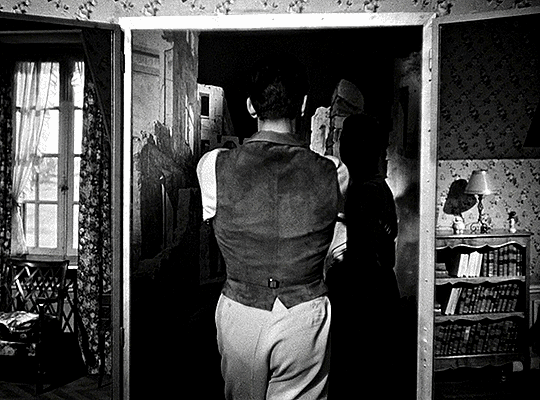

The Orphic Trilogy dir. Jean Cocteau:
Testament of Orpheus (1960)
Orpheus (1950)
The Blood of a Poet (1930)
#The Orphic Trilogy#Jean Cocteau#Testament of Orpheus#Édouard Dermit#Orpheus#Jean Marais#The Blood of a Poet#Enrique Riveros#*#**#movies#lgbt media#vintage gay#parallels#filmedit#lgbtedit#usergina#userteri#userlenie#userlenny
3K notes
·
View notes
Text
The Secrets of Beauty By Jean Cocteau
"Jean Cocteau wrote on anything he could get his hands on, wherever he could. Édouard Dermit informs us that he often saw Cocteau writing next to him in the car, or while lying down, or when at the table (between fruit and dessert courses), using the smallest scrap of paper or cloth. This version of Secrets of Beauty was composed in March 1945, on a long journey back to Paris. ... Cocteau was like one of those magicians who, having announced that they are going to reveal the secret of one trick, immediately perform another. He offered up 'secrets of beauty' so frequently that the volume from which the following notes have been extracted could almost be called New Secrets of Beauty. ... —Pierre Caizergues ..."
0 notes
Photo
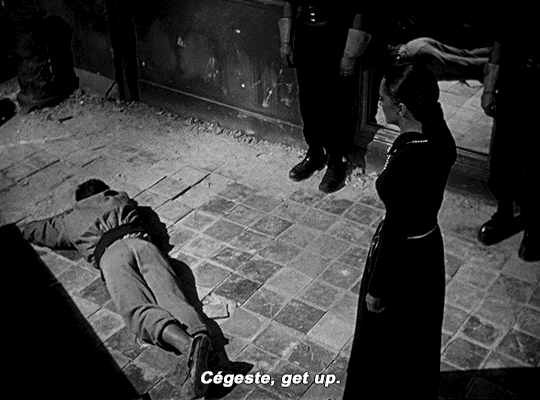

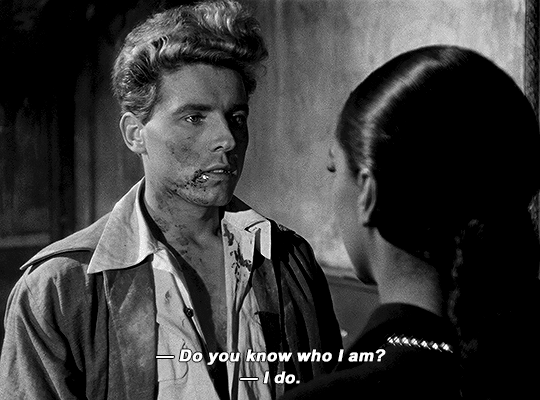
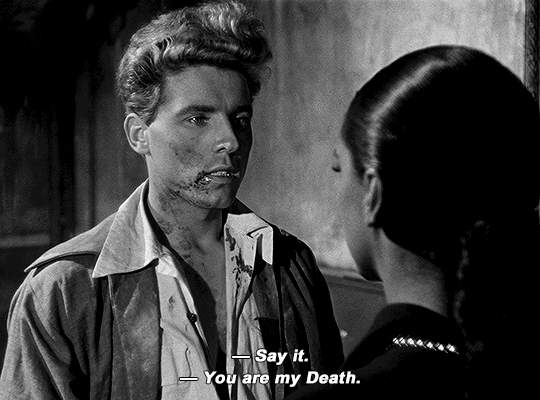
— Good. From now on you will serve me.
— I will serve you.
— You will obey my orders.
— I will obey your orders.
Orphée / Orpheus (1950) dir. Jean Cocteau
#Orphée#Orpheus#Jean Cocteau#Édouard Dermit#María Casares#filmedit#fantasyedit#1950s#film#ours#by michi#abbaskiarostami#userteri#usergina#usersav#usersrina#ritahayworrth#useralex#userbanners#userdeforest#helenspreference
1K notes
·
View notes
Text
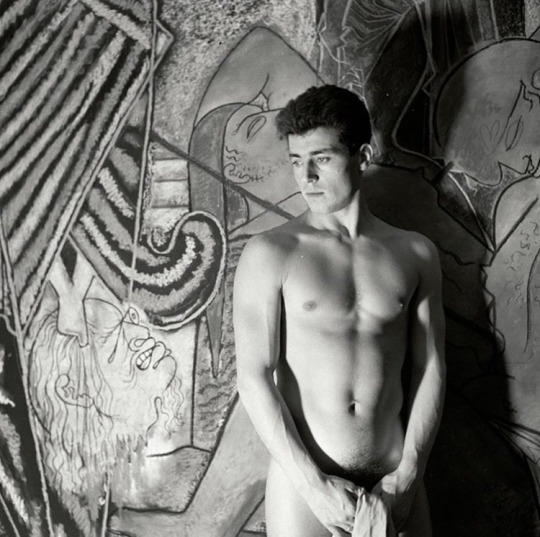
Édouard Dermit by Herbert List
91 notes
·
View notes
Text
March 9, 2021: Orpheus (1950) (Part Two)
...It occurs to me that I might not be qualified for this.

I know, film is for everybody, and everyone’s supposed to have their own interpretation of a given film, but...Cocteau, man. Cocteau is a surrealist filmmaker, and that’s not an easy film category to traverse, lemme tell you. And let me ALSO tell you, I am not looking forward to Experimental June. It will break me.

But OK, I’m getting by on my knowledge of Greek mythology, as well as my...supposed intelligence. I dunno, this movie’s making me feel pretty oonga boonga right now, not gonna lie. But anyway, let’s get on with this one, huh? Part One is right here, if you want to read it.
Recap (2/2)
After their argument, Heurtebise disappears and goes STRAIGHT to Orpheus, who’s too busy writing down one of Jacques’ poems. Dude straight up tells him that Eurydice is dead, and he’s too obsessed with the poetry to care. Imma say it...Orpheus is a shitty guy. Absolutely being a dick right now. He brushes Heurtebise off.
Meanwhile, upstairs...
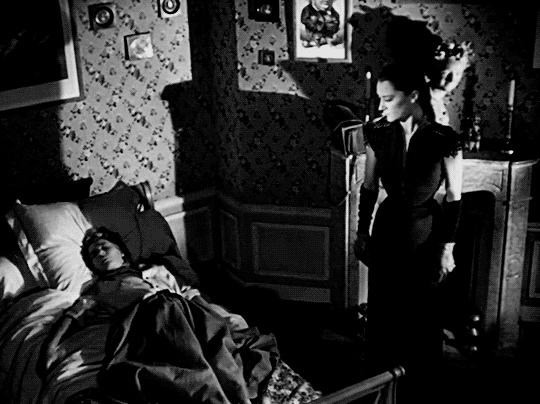
The process is complete, and the Princess and her magic color-changing dress takes control of Eurydice’s soul, and brings her through the mirror into the Underworld. She and Heurtebise continue to berate each other’s affections for their respective humans, and they will report each other for their transgressions.
They leave...and it’s gorgeous.
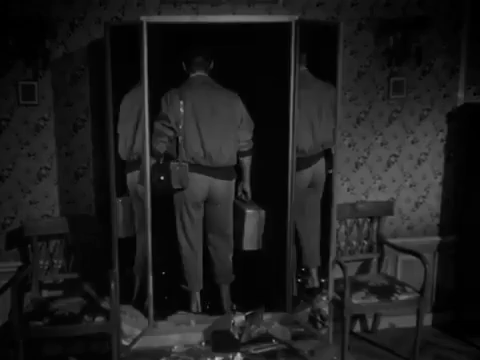
Fuckin’ NICE. That’s some Cocteau magic right there!
Anyway, Orpheus finally stops being an ass for 2 seconds and comes outside, where Heurtebise confirms Eurydice’s death to him. Upon seeing his dead wife, Orpheus realizes that he’s been a bit of a dick, and he breaks down in regret. He begins to believe that he’s dreaming once again, but Heurtebise offers him a chance to save his wife.
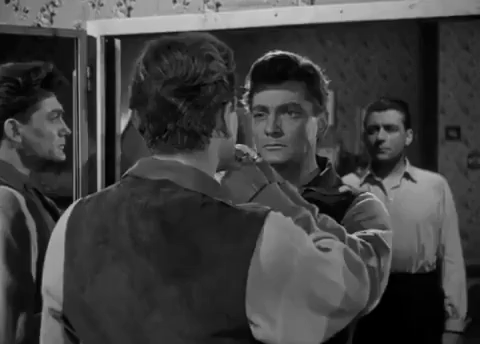
Heurtebise tells Orpheus that the Princess is indeed Death, and that Death uses mirrors to travel from place to place. He says the following:
Mirrors are the doors through which Death comes and goes. Look at yourself in a mirror all your life...and you’ll see Death at work, like bees in a hive of glass.
Haunting. But wonderfully profound. Heurtebise breaks Orpheus out of his sorrow, and convinces him to go to the Underworld to find Death and get Eurydice back. He agrees, and the two prepare. He finds Death’s gloves, which she had left there, and which he puts on with a brilliantly reversed shot. It’s...it’s surreally neat. And with those on, he can pass through a mirror like water. All he needs to do is believe.

Guuuuuuuuuuuh. FUCK YEAH. That’s extremely cool, holy shit. They pass through the mirror and enter the Underworld. As Orpheus struggles to make his way through in the background of the shot, Heutrebise is stationary in the foreground, and looks as if he isn’t even walking. What I’m saying is, it’s FUCKING AWESOME.
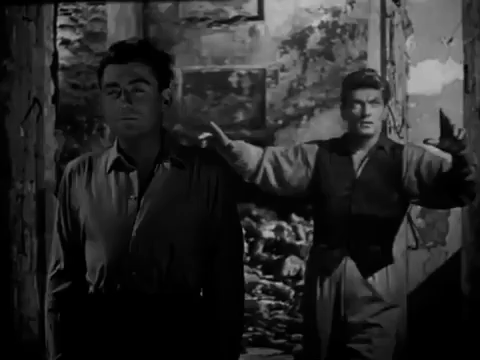
As the two continue their travels, Jacques is speaking with a council of people, interviewing him about the situation with Orpheus and Eurydice. The Princess is soon brought in to speak to the council about her pursuit of Orpheus, as well as for the death of Eurydice. She appears to brush off the accusations of this illegal activity, but are soon confronted by the newly arrived Heurtebise and Orpheus.
Heurtebise admits that he has lingered in the mortal world for too long, while the Princess admits that she took Eurydice away in order to have Orpheus all to herself. She’s made to sign a paper. Orpheus and the Princess are escorted out, while Eurydice is brought in for her own testimony against Heurtebise. Heurtebise admits that he loves Eurydice. He too is made to sign a paper.

Meanwhile, outside, Orpheus is seemingly in love with Death as well, and the two kiss. I mean...OK, dude’s Thanos, I get it. However, their love isn’t technically possible, and as they whisper sweet nothings and so forth, they are called back by the council.
The verdict is pronounced, and the Princess, Heurtebise, and Jacques are absolved. Eurydice is to be returned to life with Orpheus, but under the condition that he never look at her...AGAIN. DAMN. That’s a harsh-ass punishment. If he looks at her, she’s dead, again. Heurtebise guides the two out, and the council completely disappears.

Back in the mortal world, Orpheus and Eurydice are helped by Heurtebise in order to help them adjust to this new paradigm. Orpheus goes to get a letter from the mail, which says “You are a thief and a murderer; we will meet you at your grave.” My assumption is that it’s from the League of Women, but I’m sure we’ll get there.
However, Orpheus continues to be a dick, claiming that Eurydice doesn’t understand how bad he has it, not being able to see her. Seriously, dude is an ABSOLUTE ass. Far from the sensitive poet of the original myth, this Orpheus is a tempestuous, selfish asshole who seems to have NOTHING BUT CONTEMPT for his poor wife. Jesus. The whole affair’s made Eurydice near suicidal, but the situation doesn’t last for long. The next day, Eurydice visits Orpheus as he’s sitting once again in the car. She gets in the back seat, and he glances at her accidentally in the rear-view mirror.

Gone. POOF. Like that. And in her place, outside, it’s an angry mob, RIGHT on schedule! Orpheus goes to confront them, and Heurtebise gives him a pistol to threaten them with. The mob, stirred on by Aglaonice and a friend of Jacques’ (Roger Blin), barges in to his place. He threatens them with the revolver, but a struggle ensues, and Orpheus is shot in the heart. He’s escorted to Heurtebise’s car, where he quickly dies.
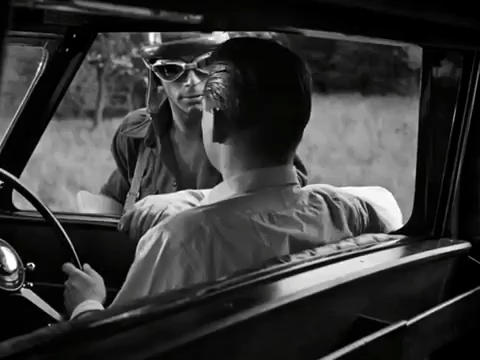
Not exactly the “torn apart” death he normally gets, but it’s still effective. Heurtebise takes him back to the Underworld, but to a place where they aren’t supposed to be going. And, uh...
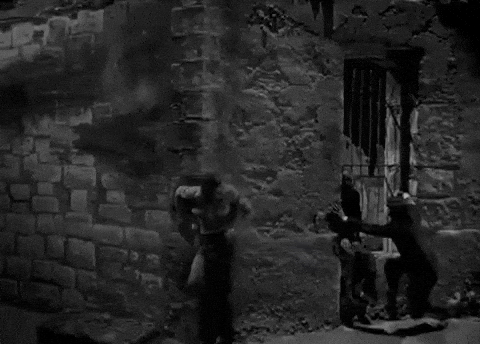
GODDAMN do I love this shit. The two are reunited with Jacques and the Princess, and the two lovers happily reunite in love, forever in the Underworld. But they can’t be together until Orpheus is made truly immortal...by the Death of a poet’s death. Yeah, the Princess is going to kill herself to make him immortal, with the help of Jacques and Heurtebise.
However, what instead happens is that Heurtebise takes Orpheus back in time, before he first came to the Underworld. This is, understand, all something the Princess is telling him to do. But as for why...I’m not yet sure. Cocteau, man, he’s a complicated artist.

Back through the mirror they go, back into the land of the living at a point that feels so long ago. And once again wearing the gloves, Orpheus takes them off in a reversal of the reversal from earlier. Fucking...cool. Heurtebise watches on as Orpheus and the living Eurydice reunite in life, with absolutely no memories of what’s passed, and no ability to see Heurtebise.
With the two finally in love again (and they actually seem to be in love this time), Heurtebise returns to the Underworld. The motorcyclists come for the Princess, to take her to a fate worse then...well, herself. Heurtebise is also taken in, leaving the still-dead Jacques behind as they pass on to an unseen fate.

...Hot diggity FUCK. That’s Orpheus. ANd goddamn, that’s a lot to unpack. I’m pretty sure it’s above my paygrade, to be honest. But, hey? This is supposed to be fun, right? Let’s live a little. See you in the Review!
#orpheus#Orphée#orpheus 1940#orphee#cocteau#jean cocteau#orphic trilogy#jean marais#François Périer#María Casares#Marie Déa#Juliette Gréco#Édouard Dermit#fantasy march#greek mythology#user365#365 movie challenge#365 movies 365 days#365 Days 365 Movies#365 movies a year
8 notes
·
View notes
Photo


Édouard Dermit (deceased)
Gender: Male
Sexuality: Bisexual
DOB: 18 January 1925
RIP: 15 May 1995
Ethnicity: French
Occupation: Actor, painter
Note: Former lover of Jean Cocteau
#Édouard Dermit#Edouard Dermit#lgbt history#lgbt#bisexual history#male#bisexual#1925#rip#historical#white#french#actor#painter#popular#popular post
123 notes
·
View notes
Photo
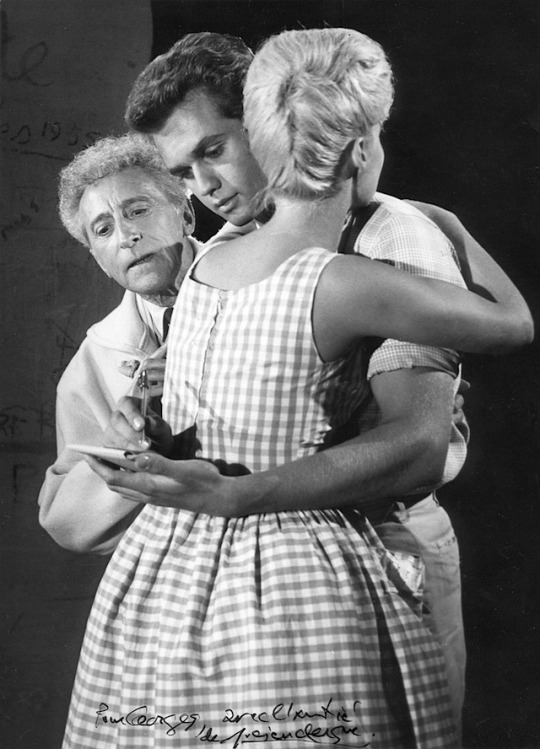
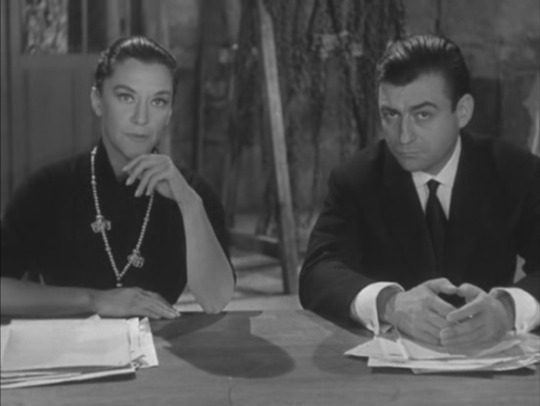
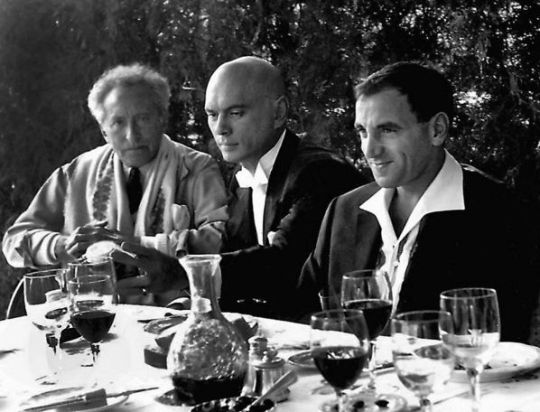
Irgendwie ist es immer Orpheus oder Ödipus. Der (zu Unrecht) der Unschuldigkeit angeklagte alternde Poet/Künstler/Filmschaffende dreht noch einen letzten Film, einen rätselhaften Traum ohne Handlung, aber mit hübschen Überraschungsgästen und einer Hibiskusbüte. “Was meinen Sie mit Film?” fragt das Tribunal.

(X)
#Le testament d’Orphée#Jean Cocteau#Maria Casarès#François Périer#Jean Marais#Édouard Dermit#Charles Aznavour#Yul Brynner#Jean-Pierre Léaud#Pablo Picasso#Film gesehen#Der französische Film der Woche
2 notes
·
View notes
Photo

Édouard Dermit & Jean Cocteau lors du tournage du Testament d'Orphée, en 1959.
13 notes
·
View notes
Photo

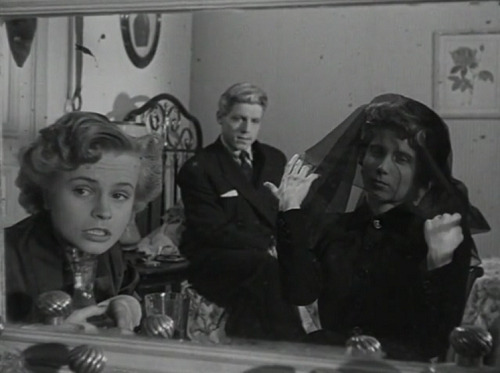

Les enfants terribles (1950) | Jean-Pierre Melville
#les enfants terribles#jean-pierre melville#jean cocteau#nicole stéphane#édouard dermit#renée cosima#the terrible children
9 notes
·
View notes
Text
2 notes
·
View notes
Photo

Édouard Dermit vu par Jean Cocteau lors d’une exposition de peinture en 1961 à Nancy #jeancocteau #jeancocteaumuseum #jeancocteaucinema #edouarddermit #edouarddermithe https://www.instagram.com/p/B_mcEf0os72/?igshid=fl279jdtnqwe
0 notes
Text
Orpheus - Jean Cocteau (1950)
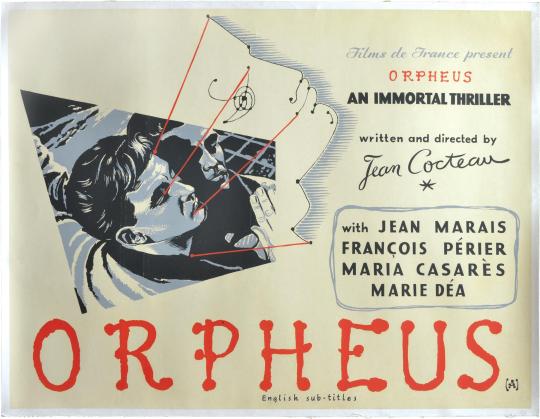
"Orpheus (French: Orphée; also the title used in the UK) is a 1950 French film directed by Jean Cocteau and starring Jean Marais. ... Set in contemporary Paris, the story of the film is a variation of the classic Greek myth of Orpheus. The picture begins with Orpheus (Marais), a famous poet, visiting the Café des Poètes. At the same time, a Princess (Casares) and Cégeste (Édouard Dermit [fr]), a handsome young poet whom she supports, arrive. The drunken Cégeste starts a brawl. When the police arrive and attempt to take Cégeste into custody, he breaks free and flees, only to be run down by two motorcycle riders. ... Instead, they drive to a chateau (the landscape through the car windows is presented in negative) accompanied by the two motorcycle riders as abstract poetry plays on the radio. This takes the form of seemingly meaningless messages, like those broadcast to the French Resistance from London during the Occupation. ..."
Wikipedia
Criterion - Orpheus: Through a Glass, Amorously
Roger Ebert
amazon
YouTube: Mark Kermode reviews Orphée (1950) | BFI Player, Orphée Bande-annonce HD

2009 March: Jean Cocteau, 2016 February: In Which Jean Cocteau Gives Elan To This Milieu
0 notes
Text
Les acquisitions de la semaine (21/05/18)

À la une : Anthropology : why it matters / Tim Ingold
Cote de rangement : GN 345 I 255812 : Domaine : Anthropologie
« Humanity is at a crossroads. We face mounting inequality, escalating political violence, warring fundamentalisms and an environmental crisis of planetary proportions. How can we fashion a world that has room for everyone, for generations to come? What are the possibilities, in such a world, of collective human life? These are urgent questions, and no discipline is better placed to address them than anthropology. It does so by bringing to bear the wisdom and experience of people everywhere, whatever their backgrounds and walks of life.
In this passionately argued book, Tim Ingold relates how a field of study once committed to ideals of progress collapsed amidst the ruins of war and colonialism, only to be reborn as a discipline of hope, destined to take centre stage in debating the most pressing intellectual, ethical and political issues of our time. He shows why anthropology matters to us all.
Introducing Polity's Why It Matters series: In these short and lively books, world-leading thinkers make the case for the importance of their subjects and aim to inspire a new generation of students.
One of the foremost anthropologists of his generation, Tim Ingold is the author of over fifteen books covering topics from evolution and social life to creativity and perception. He is a fellow of both the British Academy and the Royal Society of Edinburgh and Chair of Social Anthropology at the University of Aberdeen. His work has been read across the globe and translated into French, Spanish, Portuguese, Italian, Japanese, Estonian, Finnish, Polish, German, and many other languages. » - Quatrième de couverture</p>
Économie
Collective choice and social welfare / Amartya Sen
Cote de rangement : HB 99 .3 S 255813
Proudhon contemporain / Édouard Jourdain
Cote de rangement : HB 105 .P8 J 255801
The marginal productivity theory of distribution : a critical history / John Pullen
Cote de rangement : HB 523 P 255816
Informatique
Computer game worlds / Claus Pias
Cote de rangement : GV 1469 .14 P 255814
Cybernetics : the Macy Conferences 1946-1953 : the complete transactions / edited by Claus Pias
Cote de rangement : Q 300 C 255815
Finance
Mathématiques financières / Pierre Devolder, Mathilde Fox, Francis Vaguener
Cote de rangement : HF 5693 D 255811
Sciences du travail
Rémunération du travail : enjeux de gestion et débats de société / coordonné par Anne Stévenot, Loris Guery
Cote de rangement : HF 5549 .5.C67 R 255810
Sciences politiques
Les passeurs de livres de Daraya : une bibliothèque secrète en Syrie / Delphine Minoui
Cote de rangement : DS 98 .6 M 255804
Fascism / Roger Griffin
Cote de rangement : JC 481 G 255799
Foucault, Bourdieu et la question néolibérale / Christian Laval
Cote de rangement : JC 574 L 255809
Sociologie
Introduction à Marx / Pascal Combermale
Cote de rangement : B 3305 C 255808
Nommer l'histoire : parcours philosophiques / Bertrand Binoche
Cote de rangement : D 16 .9 B 255802
The culture of surveillance : watching as a way of life / David Lyon
Cote de rangement : HM 851 L 255797
Visual public relations : strategic communication beyond text / Simon Collister and Sarah Roberts-Bowman
Cote de rangement : HM 1221 C 255795
Xenofeminism / Helen Hester
Cote de rangement : HQ 1155 H 255798
Race and sexuality / Salvador Vidal-Ortiz, Brandon Andrew Robinson, Cristina Khan
Cote de rangement : HT 1523 V 255800
Gustav Landauer, un anarchiste de l’envers ; suivi de douze écrits "anti-politiques" de Gustav Landauer / sous la direction de Freddy Gomez
Cote de rangement : HX 897 .7 G 255803
Gestion
Management du sport / Gary Tribou, Nadine Dermit, Candice Wojak
Cote de rangement : GV 713 T 255807
Marketing
Les nouveaux produits : réussir leur développement et leur lancement / Eric Dupont
Cote de rangement : HF 5415 .153 D 255806
Anthropologie
Des lieux appropriés : économies contemporaines du Haut-Atlas / Pascal Mulet
Cote de rangement : GN 649 M 255805
Environnement
Media and transnational climate justice : indigenous activism and climate politics / Anna Roosvall and Matthew Tegelberg
Cote de rangement : GF 50 R 255796
Tous ces ouvrages sont exposés sur le présentoir des nouveautés de la BSPO. Ceux-ci pourront être empruntés à domicile à partir du 4 juin 2018.
#Anthropologie#Economie#Informatique#Finance#Sciences du Travail#SciencesPolitiques#Sociologie#Gestion#Marketing#Environnement
0 notes
Text
March 9, 2021: Orpheus (Review)
Man, I really should’ve taken a film class in college.
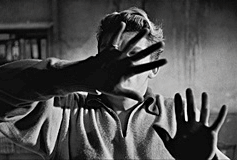
Orpheus, understand, is a fantastic film...that I am highly unqualified to judge. I man, I’m gonna give it a shot, but this isn’t gonna be a professional film essay on the reflections (ha) of this movie on the French political scene at the time or anything like that. It’s just gonna be what I thought of the movie.
And what did I think of the movie? Well, other than letting me refresh my French language skills a little, I had an excellent time with this movie. It’s stunning, it’s groundbreaking, it’s breathtaking, and it’s a great example of what can be done with clever filmmaking and practical effects. I mean, what would you expect? It’s Jean Cocteau.
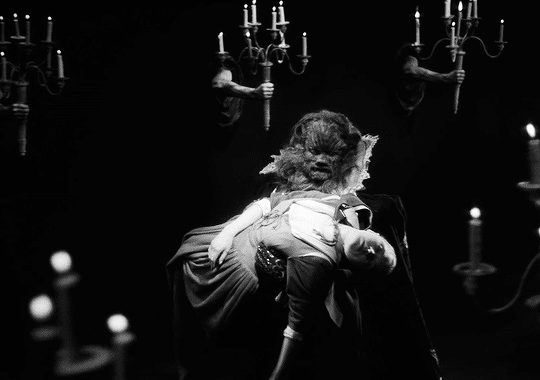
I’ve only seen one of his films prior to this, La Belle et la Bête, and that’s a beautiful film in its own right, with equally fantastic effects. Like Aladdin and The Thief of Bagdad, Disney took a lot of that film’s aesthetic and themes from Cocteau’s version of the story. What can I say, they’ve got good taste.
As for me...I’d like to think I have good taste, but that’s technically what this whole thing is for, right? To broaden my palate and further define my taste. Sooooo, what exactly did I think of this one? Check out the Recap (Part One | Part Two) if you want to see my reaction to the movie as I watched it! Otherwise...
Review

Cast and Acting: 9/10
Jean Marais is our star here, and one of Cocteau’s favorites (he was also the Beast and the Gaston in La Belle et la Bête four years earlier). He plays Orpheus like an absolute dick most of the time, which is interesting, since the character is the prototype of a tortured artist, so it makes some sense. However, that portrayal is somewhat on the writing, less so than Marais’ performance. That said, he’s still fantastic in the role. François Périer is also fucking fantastic as Heurtebise, and is genuinely my favorite character (and I still think he was meant to represent Hermes). María Casares intricately plays her complex character, an aspect of Death in love with a poet. Which, yeah, rules. And Marie Déa and Édouard Dermit were...fine as Eurydice and Jacques. Yeah, they were both very good, but I can’t say that they were perfect, especially Dermit. But still, all of these were strong performances in a strong movie.
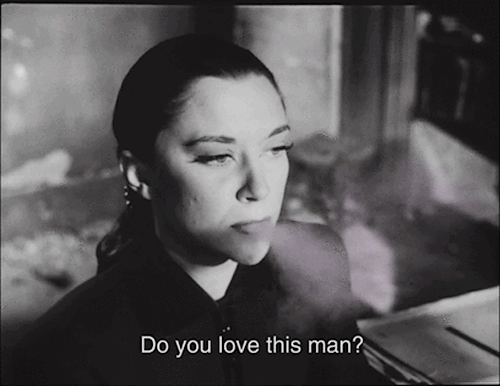
Plot and Writing: 9/10
Oh boy, the PLOT. Jean Cocteau’s screenplay is a great example of a screenplay adapted from source material, but doing something completely different with that material. It’s adaptation done...well, right, but also done creatively. Now, obviously, that’s done mostly through the visual rather than the verbal, but it’s still done VERY well. I mean, come on, they turned the tale of Orpheus into a Hades and Persephone love story as well!
Yeah, I didn’t mention it in the Recap, but think about it! An aspect of Death, referred to as royalty, falls in love with a mortal human. Said mortal is also in love with another woman (allegedly). Now, yeah, that’s basically the whole “even the Gods loved Orpheus” thing, but HE also falls in love with HER. She’s Hades, and he’s Persephone! But in the end, he needs to return to the mortal world for springtime, while Hades must remain in the Underworld...for now, anyway. Maybe that’s e over-reading a bit, but I can see it. In any case, the screenplay’s adaptation of the original story is fantastic. Not the easiest to dissect, maybe (the whole “Death loves Orpheus” thing sort of comes out of nowhere), but still great!
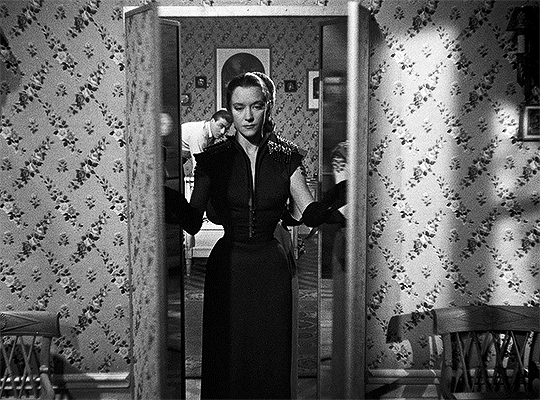
Directing and Cinematography: 10/10
I mean...it’s Jean Cocteau (and Nicolas Hayer for the cinematography). What else am I gonna do, give him a nine and say that it wasn’t perfect? I mean...come on. It was amazing. It’s Jean goddamn Cocteau. The camera movements and shot framing are goddamn spectacular IT IS JEAN FUCKING COCTEAU
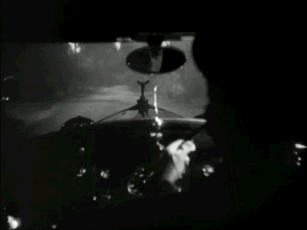
Production and Art Design: 8/10
Art design was only really OK, though. Yeah, sorry, sometimes it struck me quite well, but I don’t know that I can say the production and art design was as much of a stand out for this one. The only reason is because the camera and editing really did all of the work here, real talk. Cocteau made this movie look amazing, not as much the movie itself. But don’t get me wrong, the movie does still look amazing. Whomever did the location scouting did a great job in finding an abandoned military school for the Underworld, because it’s great looking. However, again...the way it’s all shot isn’t about the set itself, it’s about the camera work. And one other thing...

Music and Editing: 10/10
MMMMMMMMMMMWAHCHEF’SKISSBABY
Yeah, now, this is an amazing goddamn editing job be Jacqueline Sadoul, and the music by Georges Auric is equally as fantastic. This is a gorgeous film, and the editing is a HUGE part of that. Practical effects is one thing, but clever editing also made this film work as well as it did. There’s so much to unpack with that, it’s genuinely hard to go into. But hell, I don’t need to. Watch this film, especially if you have HBO Max. You’ll see what I mean, because it’s a fantastic looking movie that’s genuinely hard to describe to the unfamiliar.
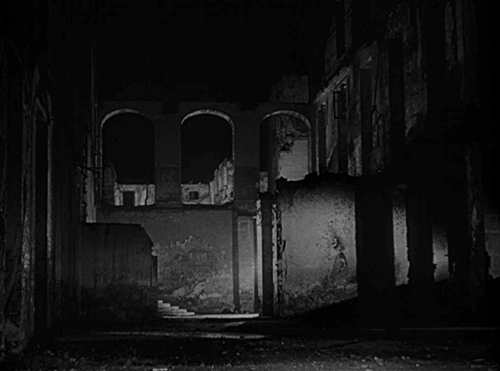
92%, and I’m not looking back.
Well, one day I probably will, because this movie was wonderful, and DEFINITELY worth another watch. Mostly so I can better figure out what’s going on, and what Cocteau’s trying to say. Although, to be fair, this movie isn’t as experimental as film can get, not by a long shot. It’s still beautiful, without a doubt, and it’s absolutely worth a second viewing.
OK. Now that that’s done, let’s go to another country renowned for its fantasy stylings. Or, to be more accurate...let’s go back. You guys ready to get spooked?
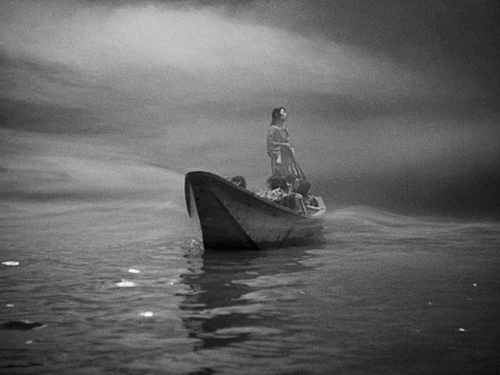
March 10, 2021: Ugetsu Monogatari (1953)
#orpheus#Orphée#orpheus 1940#orphee#cocteau#jean cocteau#orphic trilogy#jean marais#François Périer#María Casares#Marie Déa#Juliette Gréco#Édouard Dermit#fantasy march#greek mythology#user365#365 movie challenge#365 movies 365 days#365 Days 365 Movies#365 movies a year#useranais#usercande
9 notes
·
View notes
Text
March 9, 2021: Orpheus (1950) (Part One)
Greek mythology was my first mythological love.

And yes, that is ironically a very cliché thing to say about Greek mythology, since it’s by FAR the most popular and well-known mythology in the Western world, but...what can I say, I’m a sucker for the classics.
When I was 6, my mom got me a copy of the Odyssey, followed by D’Aulaire’s Book of Greek Myths, and that book was my SHIIIIIIIIIIT. From the Titanomachy to the Trojan War, from Decaulion to Daedalus, from the Lernaean Hydra to Ladon, and from Zeus to Dionysus (my second favorite Olympian), I LOVE Greek mythology.

There have been countless adaptations of these stories over the last century of so, some better and more faithful than others. We got Blood of Zeus (which I...genuinely dislike) on Netflix last year, Lore Olympus is a fantastic webcomic and modernized retelling of the universe of stories in general (fuck Apollo, that’s all I have to say), Hercules by Disney is fun (though extraordinarily inaccurate), and who doesn’t like some Percy Jackson (the books, not the movies)?
Today’s entry won’t be the first of the Greek mythology stories this month; after all, it’s DEFINITELY fantasy, so there were going to be a few entries in here. Some will come pretty close to each other later this month, but for this one, we’re jumping forward 10 years from The Thief of Bagdad to 1950. Let’s get back to France, shall we?

Famous for his adaptation of Beauty and the Beast is Jean Cocteau, legendary French surrealist filmmaker. His stylings definitely capture a sort of practical magic, compounded with clever angles and fascinating visual and practical effects. It’s evident with the classic fairy tale, which I would’ve done this month had I not already seen it. So, instead, we’ll be looking at the middle film in a trilogy known as Cocteau’s Orphic trilogy. This is, apparently, the most important one. And that makes sense, since it’s focused upon...
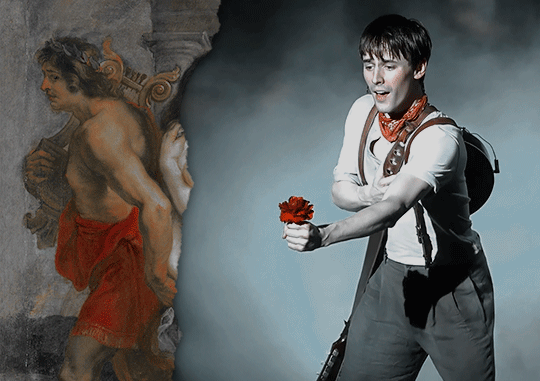
Is Hadestown good? I’m real tempted to find a way to watch it, and it sounds like it’s just up my alley. I’ll probably check it out one of these days.
Orpheus was (maybe) the son of Calliope, the muse of poetry, and Apollo, god of music. Maybe. Parentage differs based on the retelling. No matter the parents, he was renowned for his charm and grace, as well as his voice and music. He was loved by animals, nymphs, and maidens alike. He was invited to be the Bard of Jason’s DnD group (AKA the Argonauts), and used Bardic Performance to inspire his comrades (and also helped them overcome the sirens by singing EVEN LOUDER).
But the one whom he loved most was his wife, Eurydice. Unfortunately, a satyr (AKA horny horned half-goat man) chased her right into a viper’s nest, where she was bitten and died. Orpheus was CRUSHED, and his song was so depressing that even the gods cried. They said, “Dude, go to the Underworld, get back your lady from Hades, please!” And he did.
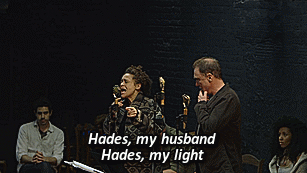
Hades, the old romantic that he secretly is, agrees to let Eurydice’s soul, on one condition. That he doesn’t look back at her as she follows him out. Orpheus agrees, but the man can’t stop himself from looking back to make sure that she’s there. And she was...and then she wasn’t. So, our sad boi fucked up, and then...well, it’s spotty.
See, some people say that he stopped worshipping Dionysus (his previous patron), and the wine boi’s female followers tore Orpheus to pieces as punishment. Some say that these same women got a liiiiiiiiiittle too into the Bacchanalia (think orgies, but religious and violent), and ripped him apart in a frenzy. And some say that he only took male lover from then on, and women tore him to pieces for not paying attention to them (also, possible homophobia). You know, it varies. Still, we can agree on the ripped apart by women thing. His head could still sing, and as the women threw his body parts into a river, it sang a song so beautiful that the rocks and branches in the river refused to strike it. His instrument of choice, a lyre, was eventually interred amongst the stars as the constellation Lyra.
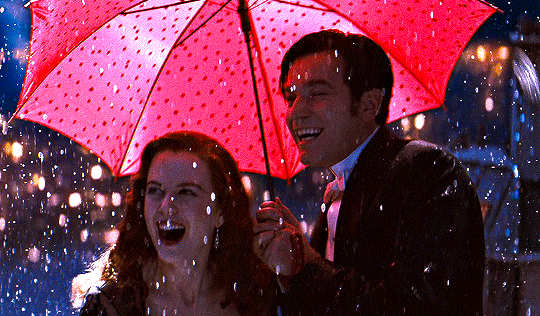
The story of a pained artist searching for a lost love and losing her is all over the goddamn place, with the crazy-ass Moulin Rouge being a solid example of it.
But OK, let’s finally begin Orpheus, or Orphée to be more accurate. Gonna be a weird ride, I guarantee it. SPOILERS AHEAD!!!
Recap (1/2)

The story starts with a recap of the original myth, and notes that it doesn’t need to be limited by time and place. This sort of story, after all, could happen anywhere and at any time. And in this case, that time and place are 1950s-era France, where we quickly meet famous poet Orpheus (Jean Marais).
At a café, he meets a friend, the Editor (Henri Crémieux), where they speak on Orpheus’ fame, which is not well-liked in a cafe frequented by poets. Also arriving there is a young drunken poet, Jacques Cégeste (Édouard Dermit), who is accompanied by his patron, known only as...the Princess (María Casares). Come on, guys, can we give our female characters names, please?

Anyway, Jacques quickly gets into a drunken brawl with other patrons, which leads to the arrival of the police at the café. They forcefully arrest him, but before they can, he’s hit by a couple of motorcycles, and potentially killed. The police bring Jacques back to the Princess’ car, with the help of her driver Heurtebise (François Périer). For unknown reasons, she summons Orpheus to help them. He agrees, and goes with them to the hospital.
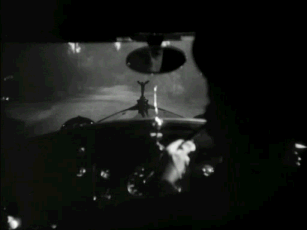
Or he would be, if they were going there. Instead, as they drive off, Orpheus discovers that Jacques is dead already. They aren’t going to the hospital. Instead, they head to a mysterious mansion, as ominous and oblique poetry plays on the radio. They’re soon accompanied by the men on the motorcycles that killed Jacques, who work for the Princess. The plot fuckin’ THICKENS.

Back at her mansion, they bring the body of Jacques upstairs, much to the confusion of Orpheus, whom the Princess keeps calling stupid whenever he asks questions. However, he’s not proving her wrong, as she immediately convinces him that she’s actually dreaming at the moment. Although...maybe he is?
She sits in front of a mirror, which breaks...somehow. Frustrated, she commands Orpheus to wait there for her to return, as she goes to check on Jacques and her men. Like me, Orpheus is confused. This gets worse for me, though, as the Princess goes to the other room and tells the dead Jacques to get up. AND HE DOES. Well, Jacques’ a zombie, I guess. He identifies the Princess as “his Death”, which she agrees to. She tells him to hold on to her coat, and then...
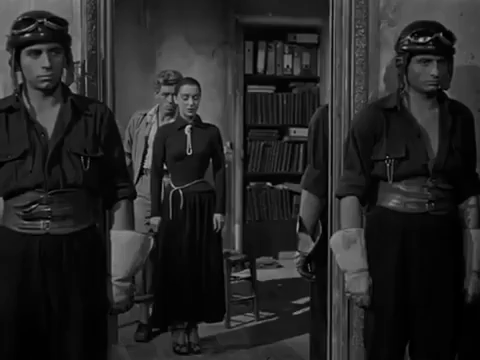
...I got questions. I GOT QUESTIONS HERE.
They go through the mirror, and the Princess’ henchmen follow, just as Orpheus walks in. He also has questions, and he tries to go through the mirror, to no avail. Completely confused at this point, he passes out against the mirror, alone in the mansion. And then...he’s outside.
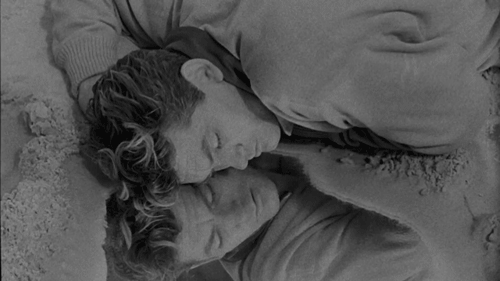
Yeah, he’s just outside now, and waiting there is Heurtebise, the chauffeur! Orpheus is freakin’ out, and Heurtebise has no answers for him, but has been told to take him back to town once he...arrived. OK. Still questions.
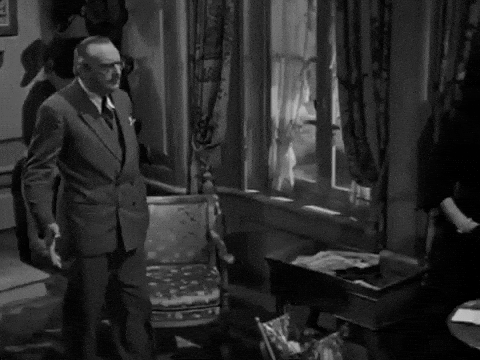
In town, the disappearance of Orpheus is being discussed by a police inspector, his wife Eurydice (Marie Déa), and her friend Aglaonice (Juliette Gréco). Aglaonice doesn’t seem to like Orpheus very much, as she’s trying to convince Eurydice that he’s cheating on her. And that’s hard to argue, since he was last seen with the Princess. However, just as there’s about to be a scandal reported by a spontaneously appearing journalist, Heurtebise and Orpheus arrive home.
After a rough encounter with the journalist, he arrives home to a relieved Eurydice, and an enraged Aglaonice, whom Orpheus also dislikes heavily. He’s apparently forbidden her from entering his house, and tells her off. The Inspector leaves too, and asks Orpheus to come to his office to discuss the matter of the missing Jacques.
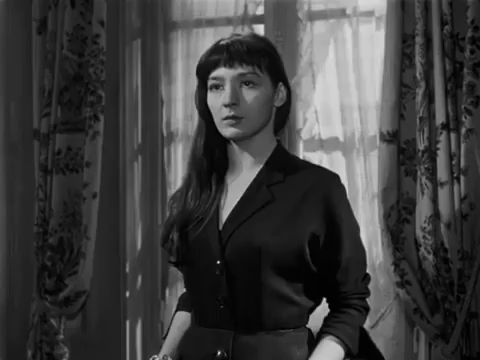
Eurydice reminds Orpheus that Aglaonice is dangerous, as she runs...the League of Women. Well...I think we know what role Aglaonice is going to play by the end of this. Her and her League of Bacchanalian Women, get me? Yikes. Anyway, the conversation turns into an argument, when the EXTREMELY ornery Orpheus basically just storms off, being a DICK to his poor wife. And when he goes upstairs to his room, he actually sneaks out of the window.
Meanwhile, Heurtebise comes into the house to offer an alibi to the pained Eurydice. While she doesn’t quite believe it, the two share some time together and seem to bond. However, when he smells gas from the stove, Heurtebise lets it slip that he committed suicide by using a gas stove. He covers it up before Eurydice notices the slip-up, but...OK. So, “the Princess” is death. Going by the traditional Greek myth, she’s some form of psychopomp, and the world beyond the mirror is the Underworld, I can only assume. OK...I can dig it.

Orpheus, meanwhile, is at the car, listening to the strange radio poetry and writing it down. The, uh, “Princess” is busy as well. Like a ghost, she walks into the household and watches Orpheus as he sleeps. A narration refers to her as Orpheus’ death. Funny, I’m pretty sure that’s going to be Aglaonice’s role.
Two days later, Orpheus is increasingly obsessed with the poetry from the mysterious radio and its odd messages. While Eurydice seems to mock this obsession, Orpheus also seems to be far too enraptured in it. But, interestingly, the messages seem to be coming from nowhere known. However, it’s all beginning to affect their marriage greatly.

On the phone, the Inspector comes calling, and Eurydice asks Heurtebise to answer the phone. He does so, and soon after, we see the phone float into place, as if placed there by a ghost. That’s confirmed as Heurtebise phases to the outside from nothing, where he meets Orpheus and informs him of the message. The two decide to head to the Inspector in his car, rather than the mysterious talking car.
While Orpheus goes through town, looking for the Princess rather than the Inspector, there’s something that I wanted to mention here. Call it an interpretation. Apparently, Heurtebise is often considered an angel by critics and interpreters. However, I’m gonna suggest that he’s actually supposed to be a representation of Hermes, the messenger god and a psychopomp who escorted souls to the Underworld. Not sure about the Princess yet, but Cocteau apparently never meant for her to be portrayed as actual death. Interesting.
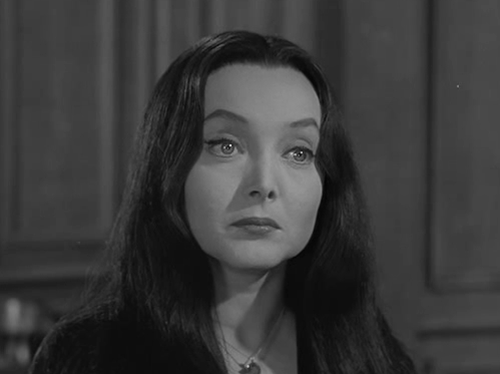
Meanwhile, at the Inspector’s office, both Aglaonice and Orpheus’ poet friends (supposedly) are accusing Orpheus of being involved in Jacques’ disappearance. The Inspector turns them away, just as Heurtebise and Orpheus reconvene in town. While Orpheus didn’t find the Princess, Heurtebise says that she came by, saying that he could stay with the married couple for now.
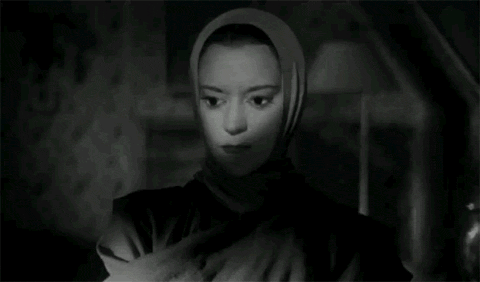
Speaking of the Princess, we see her at night, staring over Orpheus. And her eyes are...strange. They seem artificial, and it bothers the EVER-LOVING SHIT out of me. And the whole affair isn’t helping Eurydice either, as she’s tired of Orpheus’ obsession with the car, and is planning on going to Aglaonice for advice. Heurtebise tries to stop her from doing so, but she insists. But when she goes...the motorcyclists come for her. And she’s dead. As proven when the Princess arrives through the mirror.

Alongside her comes Jacques, acting as the Princess’ servant. She notes to him that their work isn’t easy, and couldn’t be done if she were dressed in the way the humans portray her. So, she is seemingly Death, or at least an aspect of Death. Obviously, as we’re talking about the Greek story, we can assume that she’s meant to be Hades in particular. But, we’ll see. It’s also confirmed, by the way, that the mysterious messages are indeed Jacques’ poetry, recited by him on the radio waves from beyond the grave. Neat.
Heurtebise is clearly upset with what’s just happened to Eurydice. He asks if the Princess actually had orders to kill Eurydice. She avoids the question, and guesses correctly that Heurtebise has fallen in love with Eurydice. He confirms this, and counters with the fact that the Princess has seemingly fallen in love with ORPHEUS. The plot fucking THICKENS.

Good place to pause, I think. Halfway mark and all. See you in Part Two!
#orpheus#orphee#Orphée#cocteau#jean cocteau#orphic trilogy#jean marais#François Périer#María Casares#Marie Déa#Juliette Gréco#Édouard Dermit#fantasy march#greek mythology#user365#365 movie challenge#365 movies 365 days#365 Days 365 Movies#365 movies a year#surreal film
10 notes
·
View notes
Photo

Édouard Dermit (1925-1995) fils adoptif de Jean Cocteau dans une rue de Metz en 1944#cocteau #metz #luxembourg #lorraine #vitrail #
0 notes